An Analysis of Ethical Dilemmas Faced by Barristers in UK Law Ethics
VerifiedAdded on 2021/06/14
|10
|2647
|64
Essay
AI Summary
This essay examines the ethical dilemmas faced by barristers in the UK, emphasizing the importance of maintaining high ethical standards within the legal profession. It discusses the role of the Bar Standards Board and the pressures barristers face in modern practice, including commercial considerations and public scrutiny. The assignment explores ethical challenges related to client loyalty, confidentiality, and conflicts of interest, referencing cases like Bolton v. The Law Society, Copeland v. Smith, and Rondel v. Worsley to illustrate these dilemmas. It highlights the need for barristers to balance their duties to clients, the court, and the broader interests of justice, while also considering the limitations of confidentiality and the potential for conflicts of interest. The essay concludes by underscoring the importance of ethical codes and standards in guiding barristers' conduct and ensuring public trust in the legal profession.
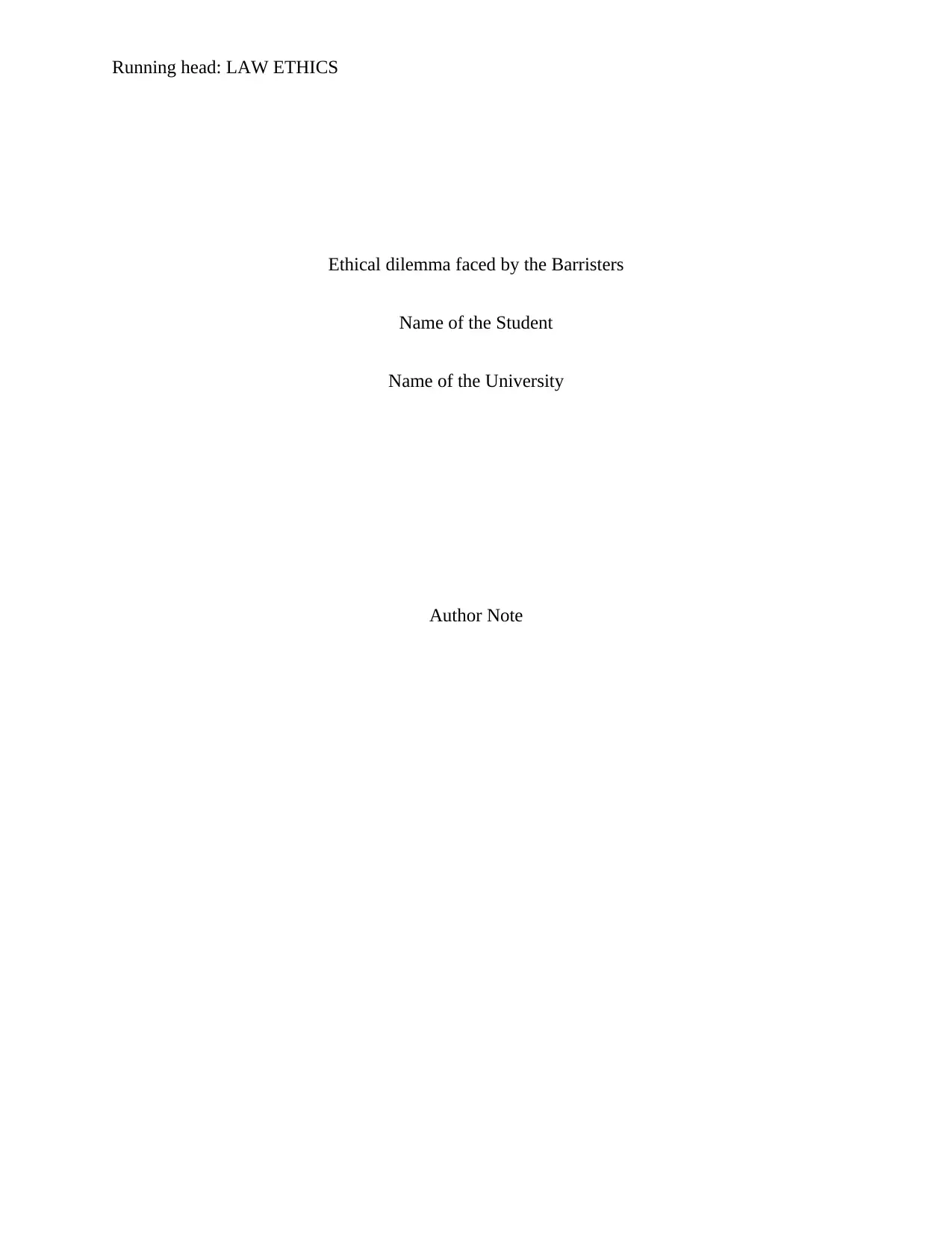
Running head: LAW ETHICS
Ethical dilemma faced by the Barristers
Name of the Student
Name of the University
Author Note
Ethical dilemma faced by the Barristers
Name of the Student
Name of the University
Author Note
Paraphrase This Document
Need a fresh take? Get an instant paraphrase of this document with our AI Paraphraser
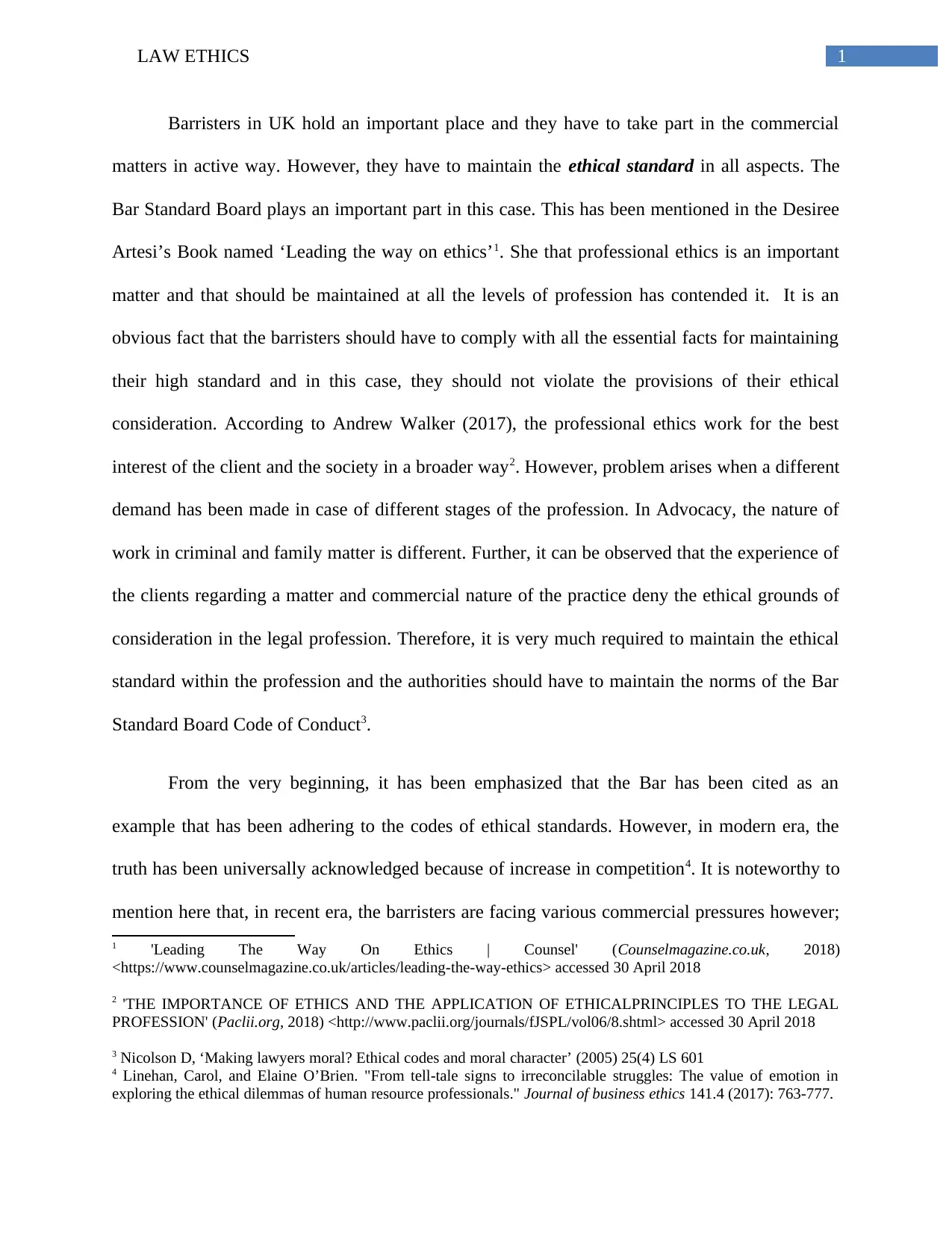
1LAW ETHICS
Barristers in UK hold an important place and they have to take part in the commercial
matters in active way. However, they have to maintain the ethical standard in all aspects. The
Bar Standard Board plays an important part in this case. This has been mentioned in the Desiree
Artesi’s Book named ‘Leading the way on ethics’1. She that professional ethics is an important
matter and that should be maintained at all the levels of profession has contended it. It is an
obvious fact that the barristers should have to comply with all the essential facts for maintaining
their high standard and in this case, they should not violate the provisions of their ethical
consideration. According to Andrew Walker (2017), the professional ethics work for the best
interest of the client and the society in a broader way2. However, problem arises when a different
demand has been made in case of different stages of the profession. In Advocacy, the nature of
work in criminal and family matter is different. Further, it can be observed that the experience of
the clients regarding a matter and commercial nature of the practice deny the ethical grounds of
consideration in the legal profession. Therefore, it is very much required to maintain the ethical
standard within the profession and the authorities should have to maintain the norms of the Bar
Standard Board Code of Conduct3.
From the very beginning, it has been emphasized that the Bar has been cited as an
example that has been adhering to the codes of ethical standards. However, in modern era, the
truth has been universally acknowledged because of increase in competition4. It is noteworthy to
mention here that, in recent era, the barristers are facing various commercial pressures however;
1 'Leading The Way On Ethics | Counsel' (Counselmagazine.co.uk, 2018)
<https://www.counselmagazine.co.uk/articles/leading-the-way-ethics> accessed 30 April 2018
2 'THE IMPORTANCE OF ETHICS AND THE APPLICATION OF ETHICALPRINCIPLES TO THE LEGAL
PROFESSION' (Paclii.org, 2018) <http://www.paclii.org/journals/fJSPL/vol06/8.shtml> accessed 30 April 2018
3 Nicolson D, ‘Making lawyers moral? Ethical codes and moral character’ (2005) 25(4) LS 601
4 Linehan, Carol, and Elaine O’Brien. "From tell-tale signs to irreconcilable struggles: The value of emotion in
exploring the ethical dilemmas of human resource professionals." Journal of business ethics 141.4 (2017): 763-777.
Barristers in UK hold an important place and they have to take part in the commercial
matters in active way. However, they have to maintain the ethical standard in all aspects. The
Bar Standard Board plays an important part in this case. This has been mentioned in the Desiree
Artesi’s Book named ‘Leading the way on ethics’1. She that professional ethics is an important
matter and that should be maintained at all the levels of profession has contended it. It is an
obvious fact that the barristers should have to comply with all the essential facts for maintaining
their high standard and in this case, they should not violate the provisions of their ethical
consideration. According to Andrew Walker (2017), the professional ethics work for the best
interest of the client and the society in a broader way2. However, problem arises when a different
demand has been made in case of different stages of the profession. In Advocacy, the nature of
work in criminal and family matter is different. Further, it can be observed that the experience of
the clients regarding a matter and commercial nature of the practice deny the ethical grounds of
consideration in the legal profession. Therefore, it is very much required to maintain the ethical
standard within the profession and the authorities should have to maintain the norms of the Bar
Standard Board Code of Conduct3.
From the very beginning, it has been emphasized that the Bar has been cited as an
example that has been adhering to the codes of ethical standards. However, in modern era, the
truth has been universally acknowledged because of increase in competition4. It is noteworthy to
mention here that, in recent era, the barristers are facing various commercial pressures however;
1 'Leading The Way On Ethics | Counsel' (Counselmagazine.co.uk, 2018)
<https://www.counselmagazine.co.uk/articles/leading-the-way-ethics> accessed 30 April 2018
2 'THE IMPORTANCE OF ETHICS AND THE APPLICATION OF ETHICALPRINCIPLES TO THE LEGAL
PROFESSION' (Paclii.org, 2018) <http://www.paclii.org/journals/fJSPL/vol06/8.shtml> accessed 30 April 2018
3 Nicolson D, ‘Making lawyers moral? Ethical codes and moral character’ (2005) 25(4) LS 601
4 Linehan, Carol, and Elaine O’Brien. "From tell-tale signs to irreconcilable struggles: The value of emotion in
exploring the ethical dilemmas of human resource professionals." Journal of business ethics 141.4 (2017): 763-777.
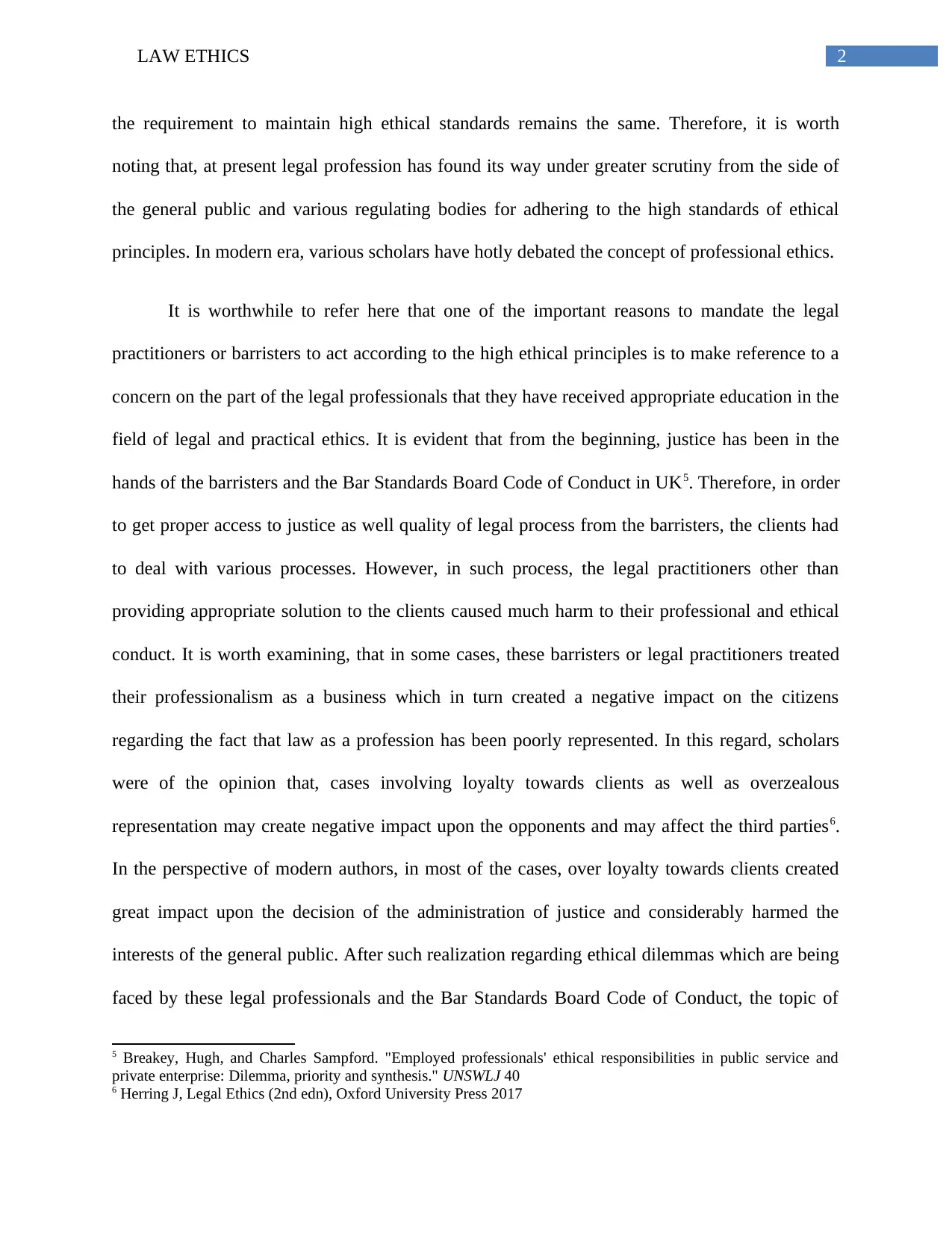
2LAW ETHICS
the requirement to maintain high ethical standards remains the same. Therefore, it is worth
noting that, at present legal profession has found its way under greater scrutiny from the side of
the general public and various regulating bodies for adhering to the high standards of ethical
principles. In modern era, various scholars have hotly debated the concept of professional ethics.
It is worthwhile to refer here that one of the important reasons to mandate the legal
practitioners or barristers to act according to the high ethical principles is to make reference to a
concern on the part of the legal professionals that they have received appropriate education in the
field of legal and practical ethics. It is evident that from the beginning, justice has been in the
hands of the barristers and the Bar Standards Board Code of Conduct in UK5. Therefore, in order
to get proper access to justice as well quality of legal process from the barristers, the clients had
to deal with various processes. However, in such process, the legal practitioners other than
providing appropriate solution to the clients caused much harm to their professional and ethical
conduct. It is worth examining, that in some cases, these barristers or legal practitioners treated
their professionalism as a business which in turn created a negative impact on the citizens
regarding the fact that law as a profession has been poorly represented. In this regard, scholars
were of the opinion that, cases involving loyalty towards clients as well as overzealous
representation may create negative impact upon the opponents and may affect the third parties6.
In the perspective of modern authors, in most of the cases, over loyalty towards clients created
great impact upon the decision of the administration of justice and considerably harmed the
interests of the general public. After such realization regarding ethical dilemmas which are being
faced by these legal professionals and the Bar Standards Board Code of Conduct, the topic of
5 Breakey, Hugh, and Charles Sampford. "Employed professionals' ethical responsibilities in public service and
private enterprise: Dilemma, priority and synthesis." UNSWLJ 40
6 Herring J, Legal Ethics (2nd edn), Oxford University Press 2017
the requirement to maintain high ethical standards remains the same. Therefore, it is worth
noting that, at present legal profession has found its way under greater scrutiny from the side of
the general public and various regulating bodies for adhering to the high standards of ethical
principles. In modern era, various scholars have hotly debated the concept of professional ethics.
It is worthwhile to refer here that one of the important reasons to mandate the legal
practitioners or barristers to act according to the high ethical principles is to make reference to a
concern on the part of the legal professionals that they have received appropriate education in the
field of legal and practical ethics. It is evident that from the beginning, justice has been in the
hands of the barristers and the Bar Standards Board Code of Conduct in UK5. Therefore, in order
to get proper access to justice as well quality of legal process from the barristers, the clients had
to deal with various processes. However, in such process, the legal practitioners other than
providing appropriate solution to the clients caused much harm to their professional and ethical
conduct. It is worth examining, that in some cases, these barristers or legal practitioners treated
their professionalism as a business which in turn created a negative impact on the citizens
regarding the fact that law as a profession has been poorly represented. In this regard, scholars
were of the opinion that, cases involving loyalty towards clients as well as overzealous
representation may create negative impact upon the opponents and may affect the third parties6.
In the perspective of modern authors, in most of the cases, over loyalty towards clients created
great impact upon the decision of the administration of justice and considerably harmed the
interests of the general public. After such realization regarding ethical dilemmas which are being
faced by these legal professionals and the Bar Standards Board Code of Conduct, the topic of
5 Breakey, Hugh, and Charles Sampford. "Employed professionals' ethical responsibilities in public service and
private enterprise: Dilemma, priority and synthesis." UNSWLJ 40
6 Herring J, Legal Ethics (2nd edn), Oxford University Press 2017
⊘ This is a preview!⊘
Do you want full access?
Subscribe today to unlock all pages.

Trusted by 1+ million students worldwide
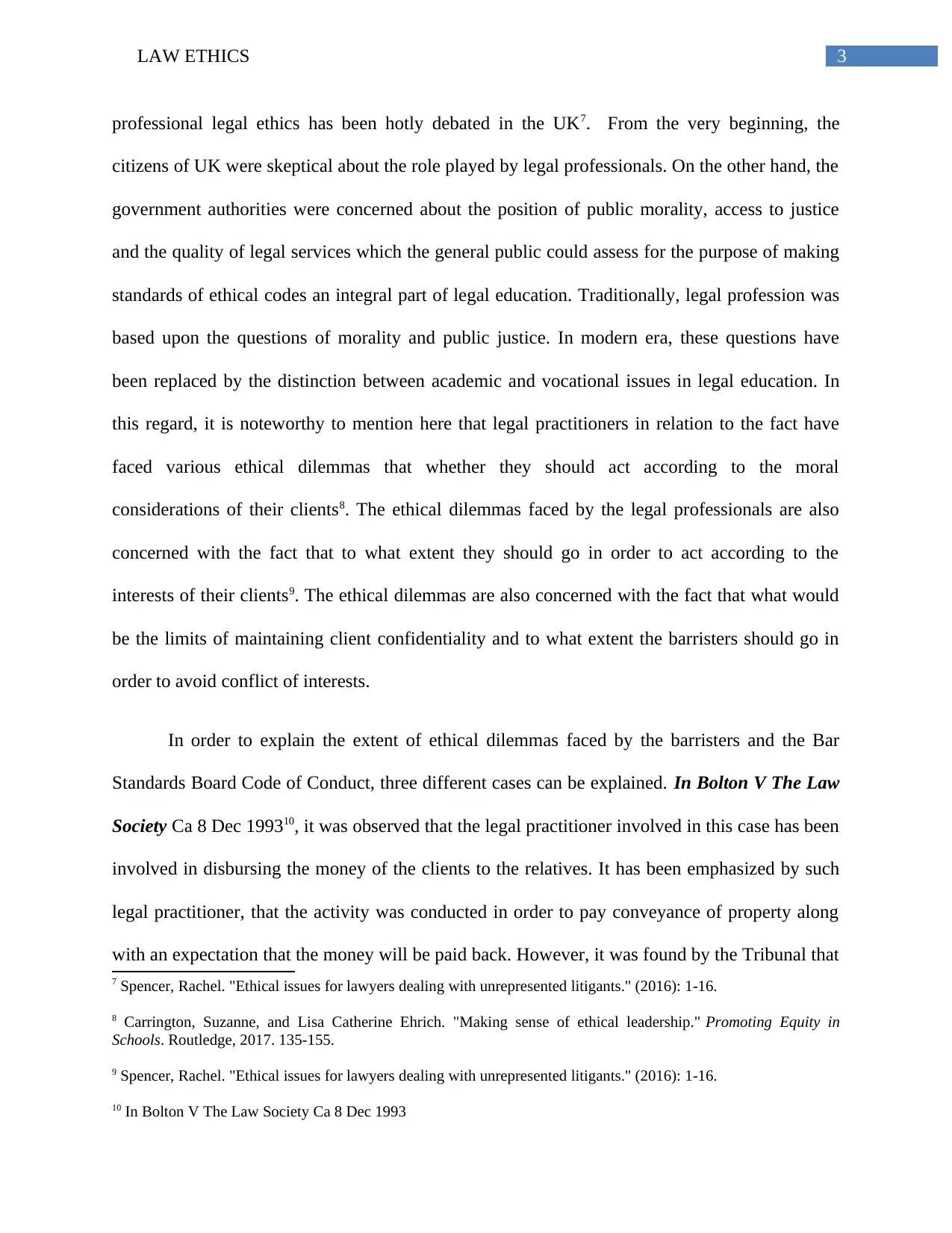
3LAW ETHICS
professional legal ethics has been hotly debated in the UK7. From the very beginning, the
citizens of UK were skeptical about the role played by legal professionals. On the other hand, the
government authorities were concerned about the position of public morality, access to justice
and the quality of legal services which the general public could assess for the purpose of making
standards of ethical codes an integral part of legal education. Traditionally, legal profession was
based upon the questions of morality and public justice. In modern era, these questions have
been replaced by the distinction between academic and vocational issues in legal education. In
this regard, it is noteworthy to mention here that legal practitioners in relation to the fact have
faced various ethical dilemmas that whether they should act according to the moral
considerations of their clients8. The ethical dilemmas faced by the legal professionals are also
concerned with the fact that to what extent they should go in order to act according to the
interests of their clients9. The ethical dilemmas are also concerned with the fact that what would
be the limits of maintaining client confidentiality and to what extent the barristers should go in
order to avoid conflict of interests.
In order to explain the extent of ethical dilemmas faced by the barristers and the Bar
Standards Board Code of Conduct, three different cases can be explained. In Bolton V The Law
Society Ca 8 Dec 199310, it was observed that the legal practitioner involved in this case has been
involved in disbursing the money of the clients to the relatives. It has been emphasized by such
legal practitioner, that the activity was conducted in order to pay conveyance of property along
with an expectation that the money will be paid back. However, it was found by the Tribunal that
7 Spencer, Rachel. "Ethical issues for lawyers dealing with unrepresented litigants." (2016): 1-16.
8 Carrington, Suzanne, and Lisa Catherine Ehrich. "Making sense of ethical leadership." Promoting Equity in
Schools. Routledge, 2017. 135-155.
9 Spencer, Rachel. "Ethical issues for lawyers dealing with unrepresented litigants." (2016): 1-16.
10 In Bolton V The Law Society Ca 8 Dec 1993
professional legal ethics has been hotly debated in the UK7. From the very beginning, the
citizens of UK were skeptical about the role played by legal professionals. On the other hand, the
government authorities were concerned about the position of public morality, access to justice
and the quality of legal services which the general public could assess for the purpose of making
standards of ethical codes an integral part of legal education. Traditionally, legal profession was
based upon the questions of morality and public justice. In modern era, these questions have
been replaced by the distinction between academic and vocational issues in legal education. In
this regard, it is noteworthy to mention here that legal practitioners in relation to the fact have
faced various ethical dilemmas that whether they should act according to the moral
considerations of their clients8. The ethical dilemmas faced by the legal professionals are also
concerned with the fact that to what extent they should go in order to act according to the
interests of their clients9. The ethical dilemmas are also concerned with the fact that what would
be the limits of maintaining client confidentiality and to what extent the barristers should go in
order to avoid conflict of interests.
In order to explain the extent of ethical dilemmas faced by the barristers and the Bar
Standards Board Code of Conduct, three different cases can be explained. In Bolton V The Law
Society Ca 8 Dec 199310, it was observed that the legal practitioner involved in this case has been
involved in disbursing the money of the clients to the relatives. It has been emphasized by such
legal practitioner, that the activity was conducted in order to pay conveyance of property along
with an expectation that the money will be paid back. However, it was found by the Tribunal that
7 Spencer, Rachel. "Ethical issues for lawyers dealing with unrepresented litigants." (2016): 1-16.
8 Carrington, Suzanne, and Lisa Catherine Ehrich. "Making sense of ethical leadership." Promoting Equity in
Schools. Routledge, 2017. 135-155.
9 Spencer, Rachel. "Ethical issues for lawyers dealing with unrepresented litigants." (2016): 1-16.
10 In Bolton V The Law Society Ca 8 Dec 1993
Paraphrase This Document
Need a fresh take? Get an instant paraphrase of this document with our AI Paraphraser
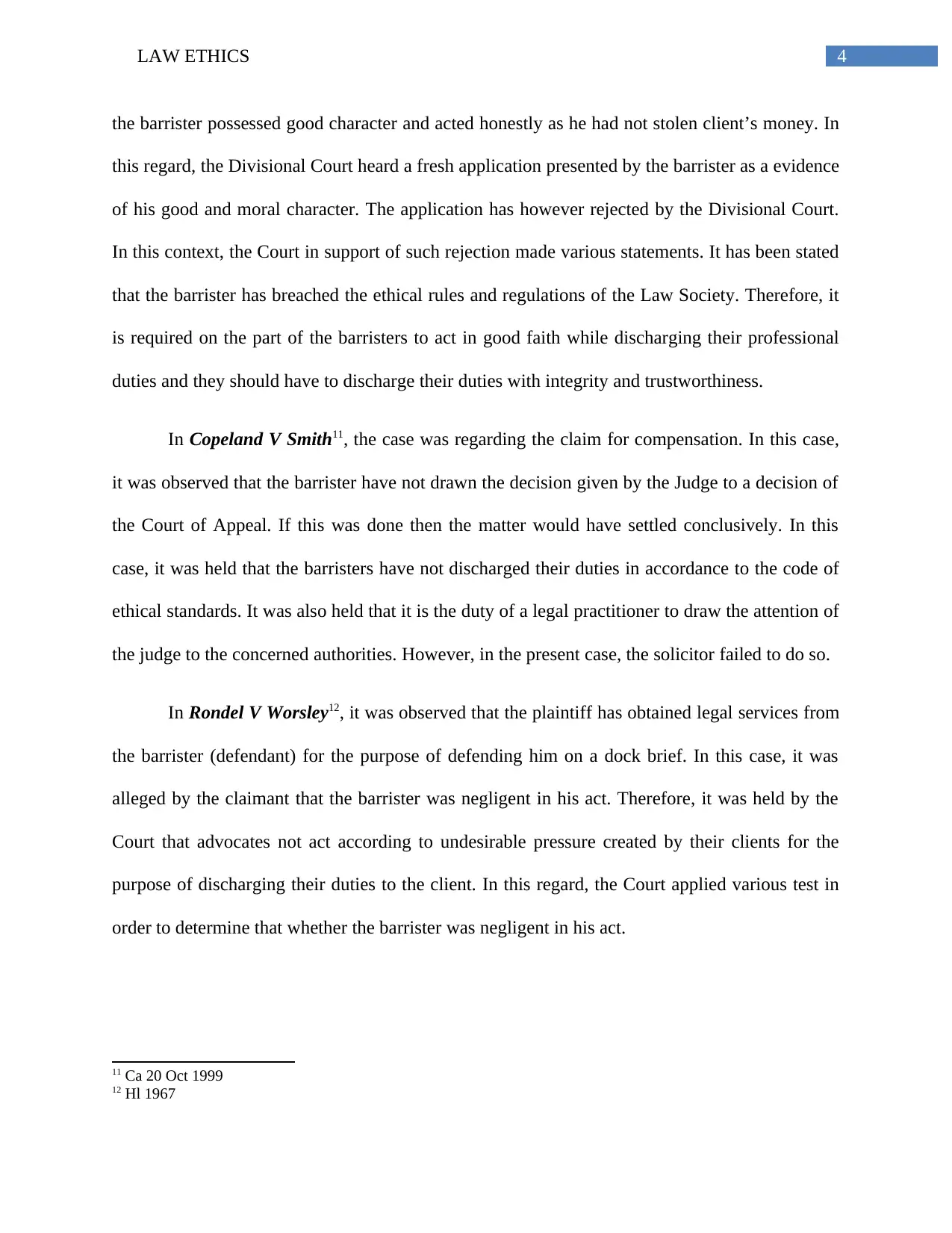
4LAW ETHICS
the barrister possessed good character and acted honestly as he had not stolen client’s money. In
this regard, the Divisional Court heard a fresh application presented by the barrister as a evidence
of his good and moral character. The application has however rejected by the Divisional Court.
In this context, the Court in support of such rejection made various statements. It has been stated
that the barrister has breached the ethical rules and regulations of the Law Society. Therefore, it
is required on the part of the barristers to act in good faith while discharging their professional
duties and they should have to discharge their duties with integrity and trustworthiness.
In Copeland V Smith11, the case was regarding the claim for compensation. In this case,
it was observed that the barrister have not drawn the decision given by the Judge to a decision of
the Court of Appeal. If this was done then the matter would have settled conclusively. In this
case, it was held that the barristers have not discharged their duties in accordance to the code of
ethical standards. It was also held that it is the duty of a legal practitioner to draw the attention of
the judge to the concerned authorities. However, in the present case, the solicitor failed to do so.
In Rondel V Worsley12, it was observed that the plaintiff has obtained legal services from
the barrister (defendant) for the purpose of defending him on a dock brief. In this case, it was
alleged by the claimant that the barrister was negligent in his act. Therefore, it was held by the
Court that advocates not act according to undesirable pressure created by their clients for the
purpose of discharging their duties to the client. In this regard, the Court applied various test in
order to determine that whether the barrister was negligent in his act.
11 Ca 20 Oct 1999
12 Hl 1967
the barrister possessed good character and acted honestly as he had not stolen client’s money. In
this regard, the Divisional Court heard a fresh application presented by the barrister as a evidence
of his good and moral character. The application has however rejected by the Divisional Court.
In this context, the Court in support of such rejection made various statements. It has been stated
that the barrister has breached the ethical rules and regulations of the Law Society. Therefore, it
is required on the part of the barristers to act in good faith while discharging their professional
duties and they should have to discharge their duties with integrity and trustworthiness.
In Copeland V Smith11, the case was regarding the claim for compensation. In this case,
it was observed that the barrister have not drawn the decision given by the Judge to a decision of
the Court of Appeal. If this was done then the matter would have settled conclusively. In this
case, it was held that the barristers have not discharged their duties in accordance to the code of
ethical standards. It was also held that it is the duty of a legal practitioner to draw the attention of
the judge to the concerned authorities. However, in the present case, the solicitor failed to do so.
In Rondel V Worsley12, it was observed that the plaintiff has obtained legal services from
the barrister (defendant) for the purpose of defending him on a dock brief. In this case, it was
alleged by the claimant that the barrister was negligent in his act. Therefore, it was held by the
Court that advocates not act according to undesirable pressure created by their clients for the
purpose of discharging their duties to the client. In this regard, the Court applied various test in
order to determine that whether the barrister was negligent in his act.
11 Ca 20 Oct 1999
12 Hl 1967
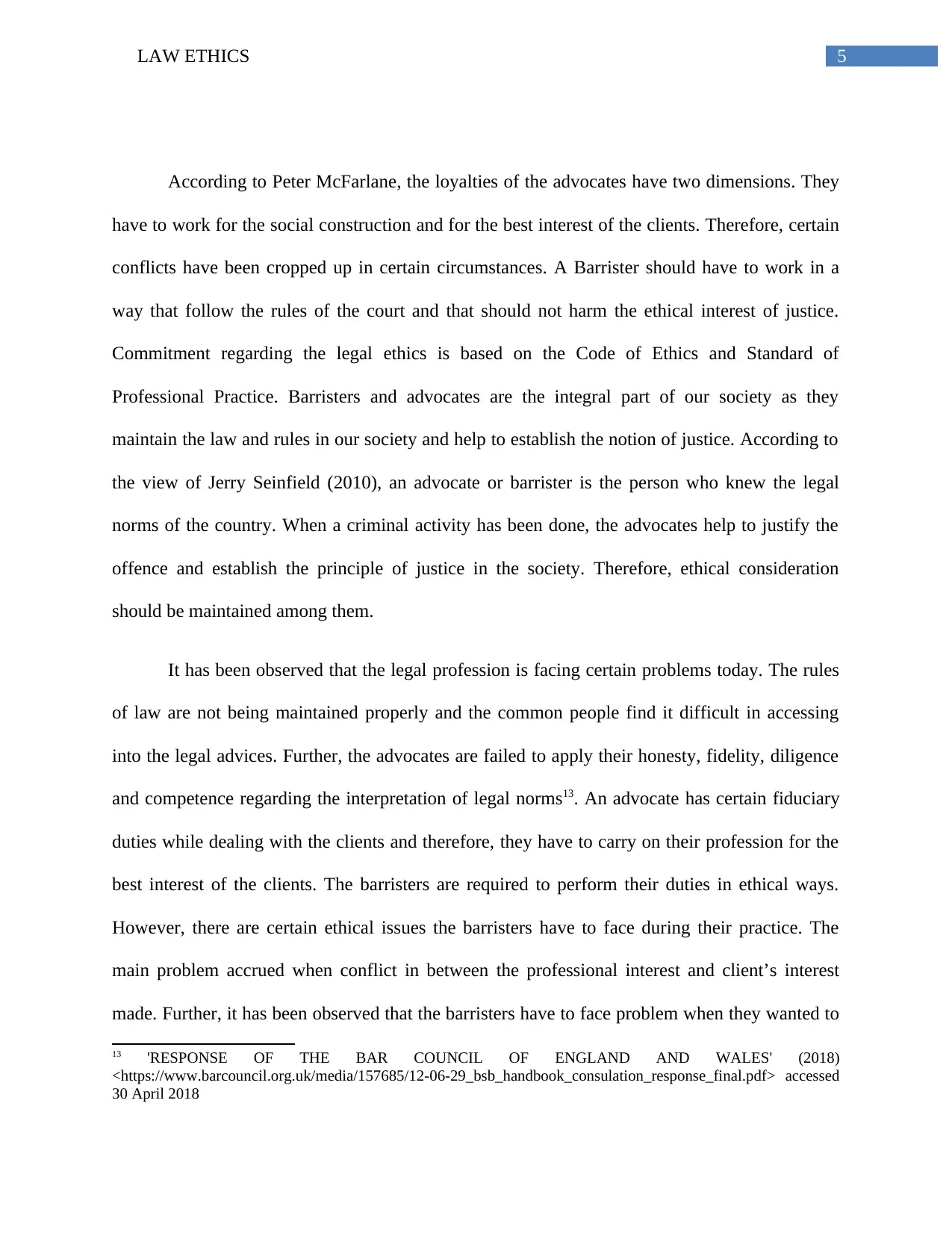
5LAW ETHICS
According to Peter McFarlane, the loyalties of the advocates have two dimensions. They
have to work for the social construction and for the best interest of the clients. Therefore, certain
conflicts have been cropped up in certain circumstances. A Barrister should have to work in a
way that follow the rules of the court and that should not harm the ethical interest of justice.
Commitment regarding the legal ethics is based on the Code of Ethics and Standard of
Professional Practice. Barristers and advocates are the integral part of our society as they
maintain the law and rules in our society and help to establish the notion of justice. According to
the view of Jerry Seinfield (2010), an advocate or barrister is the person who knew the legal
norms of the country. When a criminal activity has been done, the advocates help to justify the
offence and establish the principle of justice in the society. Therefore, ethical consideration
should be maintained among them.
It has been observed that the legal profession is facing certain problems today. The rules
of law are not being maintained properly and the common people find it difficult in accessing
into the legal advices. Further, the advocates are failed to apply their honesty, fidelity, diligence
and competence regarding the interpretation of legal norms13. An advocate has certain fiduciary
duties while dealing with the clients and therefore, they have to carry on their profession for the
best interest of the clients. The barristers are required to perform their duties in ethical ways.
However, there are certain ethical issues the barristers have to face during their practice. The
main problem accrued when conflict in between the professional interest and client’s interest
made. Further, it has been observed that the barristers have to face problem when they wanted to
13 'RESPONSE OF THE BAR COUNCIL OF ENGLAND AND WALES' (2018)
<https://www.barcouncil.org.uk/media/157685/12-06-29_bsb_handbook_consulation_response_final.pdf> accessed
30 April 2018
According to Peter McFarlane, the loyalties of the advocates have two dimensions. They
have to work for the social construction and for the best interest of the clients. Therefore, certain
conflicts have been cropped up in certain circumstances. A Barrister should have to work in a
way that follow the rules of the court and that should not harm the ethical interest of justice.
Commitment regarding the legal ethics is based on the Code of Ethics and Standard of
Professional Practice. Barristers and advocates are the integral part of our society as they
maintain the law and rules in our society and help to establish the notion of justice. According to
the view of Jerry Seinfield (2010), an advocate or barrister is the person who knew the legal
norms of the country. When a criminal activity has been done, the advocates help to justify the
offence and establish the principle of justice in the society. Therefore, ethical consideration
should be maintained among them.
It has been observed that the legal profession is facing certain problems today. The rules
of law are not being maintained properly and the common people find it difficult in accessing
into the legal advices. Further, the advocates are failed to apply their honesty, fidelity, diligence
and competence regarding the interpretation of legal norms13. An advocate has certain fiduciary
duties while dealing with the clients and therefore, they have to carry on their profession for the
best interest of the clients. The barristers are required to perform their duties in ethical ways.
However, there are certain ethical issues the barristers have to face during their practice. The
main problem accrued when conflict in between the professional interest and client’s interest
made. Further, it has been observed that the barristers have to face problem when they wanted to
13 'RESPONSE OF THE BAR COUNCIL OF ENGLAND AND WALES' (2018)
<https://www.barcouncil.org.uk/media/157685/12-06-29_bsb_handbook_consulation_response_final.pdf> accessed
30 April 2018
⊘ This is a preview!⊘
Do you want full access?
Subscribe today to unlock all pages.

Trusted by 1+ million students worldwide
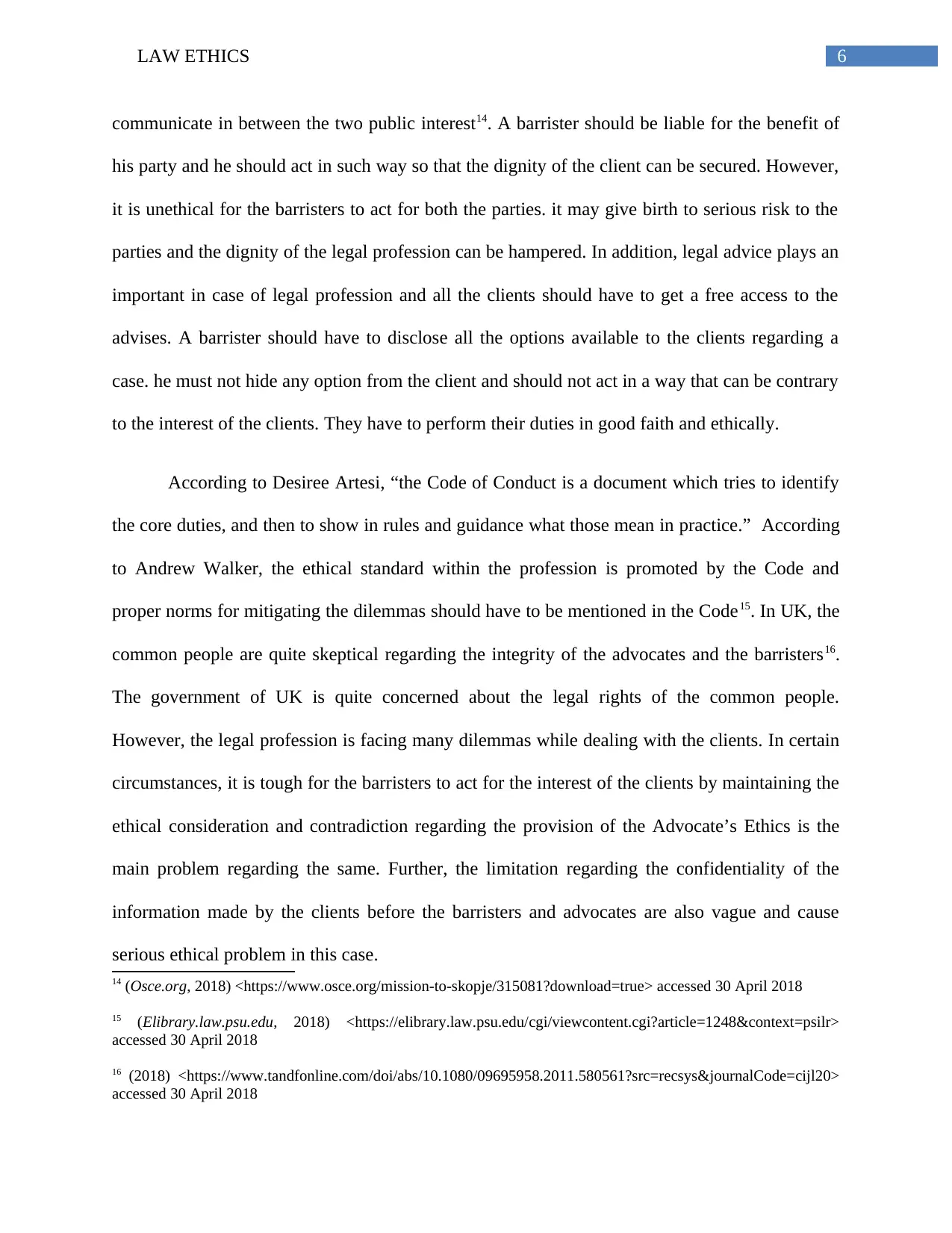
6LAW ETHICS
communicate in between the two public interest14. A barrister should be liable for the benefit of
his party and he should act in such way so that the dignity of the client can be secured. However,
it is unethical for the barristers to act for both the parties. it may give birth to serious risk to the
parties and the dignity of the legal profession can be hampered. In addition, legal advice plays an
important in case of legal profession and all the clients should have to get a free access to the
advises. A barrister should have to disclose all the options available to the clients regarding a
case. he must not hide any option from the client and should not act in a way that can be contrary
to the interest of the clients. They have to perform their duties in good faith and ethically.
According to Desiree Artesi, “the Code of Conduct is a document which tries to identify
the core duties, and then to show in rules and guidance what those mean in practice.” According
to Andrew Walker, the ethical standard within the profession is promoted by the Code and
proper norms for mitigating the dilemmas should have to be mentioned in the Code15. In UK, the
common people are quite skeptical regarding the integrity of the advocates and the barristers16.
The government of UK is quite concerned about the legal rights of the common people.
However, the legal profession is facing many dilemmas while dealing with the clients. In certain
circumstances, it is tough for the barristers to act for the interest of the clients by maintaining the
ethical consideration and contradiction regarding the provision of the Advocate’s Ethics is the
main problem regarding the same. Further, the limitation regarding the confidentiality of the
information made by the clients before the barristers and advocates are also vague and cause
serious ethical problem in this case.
14 (Osce.org, 2018) <https://www.osce.org/mission-to-skopje/315081?download=true> accessed 30 April 2018
15 (Elibrary.law.psu.edu, 2018) <https://elibrary.law.psu.edu/cgi/viewcontent.cgi?article=1248&context=psilr>
accessed 30 April 2018
16 (2018) <https://www.tandfonline.com/doi/abs/10.1080/09695958.2011.580561?src=recsys&journalCode=cijl20>
accessed 30 April 2018
communicate in between the two public interest14. A barrister should be liable for the benefit of
his party and he should act in such way so that the dignity of the client can be secured. However,
it is unethical for the barristers to act for both the parties. it may give birth to serious risk to the
parties and the dignity of the legal profession can be hampered. In addition, legal advice plays an
important in case of legal profession and all the clients should have to get a free access to the
advises. A barrister should have to disclose all the options available to the clients regarding a
case. he must not hide any option from the client and should not act in a way that can be contrary
to the interest of the clients. They have to perform their duties in good faith and ethically.
According to Desiree Artesi, “the Code of Conduct is a document which tries to identify
the core duties, and then to show in rules and guidance what those mean in practice.” According
to Andrew Walker, the ethical standard within the profession is promoted by the Code and
proper norms for mitigating the dilemmas should have to be mentioned in the Code15. In UK, the
common people are quite skeptical regarding the integrity of the advocates and the barristers16.
The government of UK is quite concerned about the legal rights of the common people.
However, the legal profession is facing many dilemmas while dealing with the clients. In certain
circumstances, it is tough for the barristers to act for the interest of the clients by maintaining the
ethical consideration and contradiction regarding the provision of the Advocate’s Ethics is the
main problem regarding the same. Further, the limitation regarding the confidentiality of the
information made by the clients before the barristers and advocates are also vague and cause
serious ethical problem in this case.
14 (Osce.org, 2018) <https://www.osce.org/mission-to-skopje/315081?download=true> accessed 30 April 2018
15 (Elibrary.law.psu.edu, 2018) <https://elibrary.law.psu.edu/cgi/viewcontent.cgi?article=1248&context=psilr>
accessed 30 April 2018
16 (2018) <https://www.tandfonline.com/doi/abs/10.1080/09695958.2011.580561?src=recsys&journalCode=cijl20>
accessed 30 April 2018
Paraphrase This Document
Need a fresh take? Get an instant paraphrase of this document with our AI Paraphraser
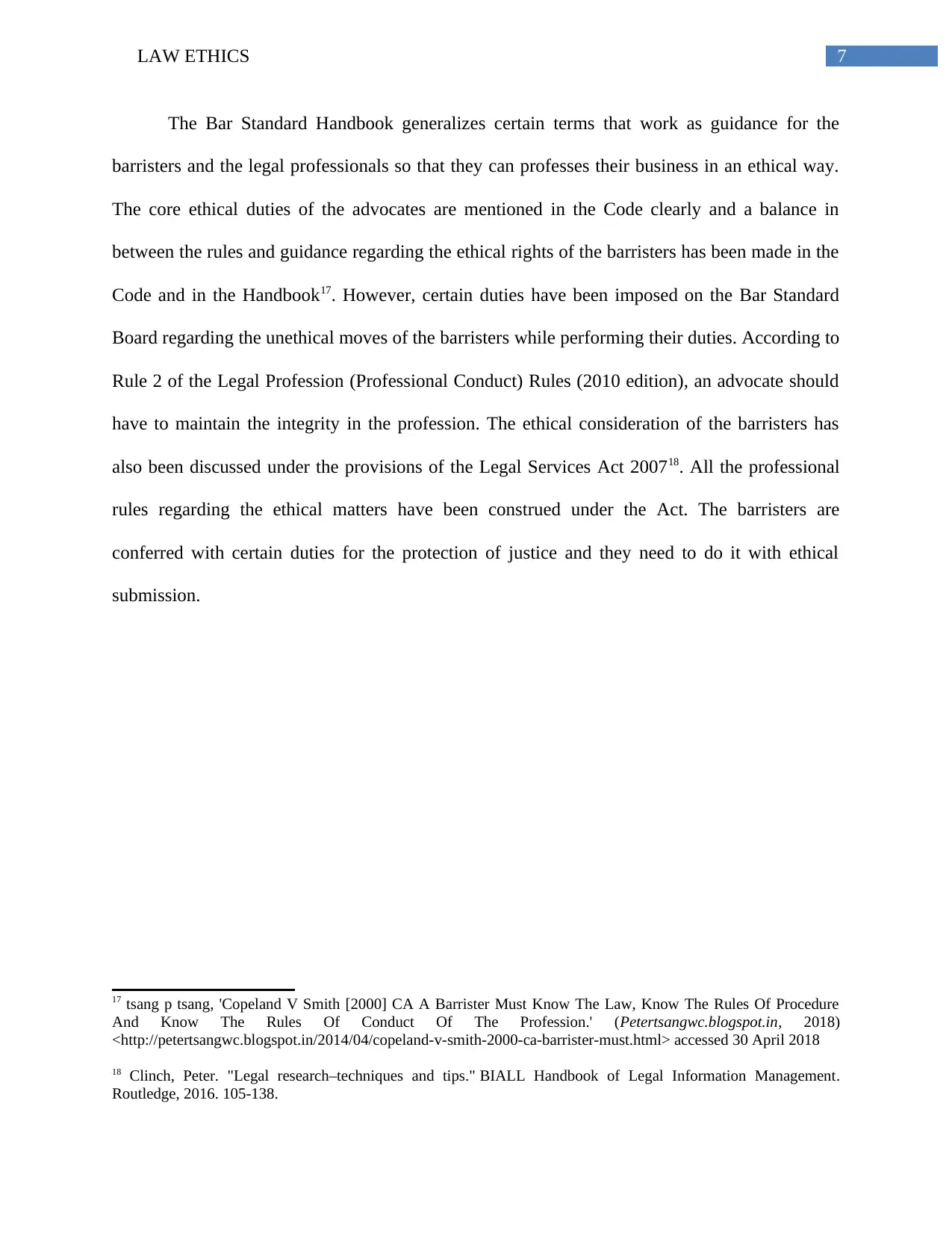
7LAW ETHICS
The Bar Standard Handbook generalizes certain terms that work as guidance for the
barristers and the legal professionals so that they can professes their business in an ethical way.
The core ethical duties of the advocates are mentioned in the Code clearly and a balance in
between the rules and guidance regarding the ethical rights of the barristers has been made in the
Code and in the Handbook17. However, certain duties have been imposed on the Bar Standard
Board regarding the unethical moves of the barristers while performing their duties. According to
Rule 2 of the Legal Profession (Professional Conduct) Rules (2010 edition), an advocate should
have to maintain the integrity in the profession. The ethical consideration of the barristers has
also been discussed under the provisions of the Legal Services Act 200718. All the professional
rules regarding the ethical matters have been construed under the Act. The barristers are
conferred with certain duties for the protection of justice and they need to do it with ethical
submission.
17 tsang p tsang, 'Copeland V Smith [2000] CA A Barrister Must Know The Law, Know The Rules Of Procedure
And Know The Rules Of Conduct Of The Profession.' (Petertsangwc.blogspot.in, 2018)
<http://petertsangwc.blogspot.in/2014/04/copeland-v-smith-2000-ca-barrister-must.html> accessed 30 April 2018
18 Clinch, Peter. "Legal research–techniques and tips." BIALL Handbook of Legal Information Management.
Routledge, 2016. 105-138.
The Bar Standard Handbook generalizes certain terms that work as guidance for the
barristers and the legal professionals so that they can professes their business in an ethical way.
The core ethical duties of the advocates are mentioned in the Code clearly and a balance in
between the rules and guidance regarding the ethical rights of the barristers has been made in the
Code and in the Handbook17. However, certain duties have been imposed on the Bar Standard
Board regarding the unethical moves of the barristers while performing their duties. According to
Rule 2 of the Legal Profession (Professional Conduct) Rules (2010 edition), an advocate should
have to maintain the integrity in the profession. The ethical consideration of the barristers has
also been discussed under the provisions of the Legal Services Act 200718. All the professional
rules regarding the ethical matters have been construed under the Act. The barristers are
conferred with certain duties for the protection of justice and they need to do it with ethical
submission.
17 tsang p tsang, 'Copeland V Smith [2000] CA A Barrister Must Know The Law, Know The Rules Of Procedure
And Know The Rules Of Conduct Of The Profession.' (Petertsangwc.blogspot.in, 2018)
<http://petertsangwc.blogspot.in/2014/04/copeland-v-smith-2000-ca-barrister-must.html> accessed 30 April 2018
18 Clinch, Peter. "Legal research–techniques and tips." BIALL Handbook of Legal Information Management.
Routledge, 2016. 105-138.
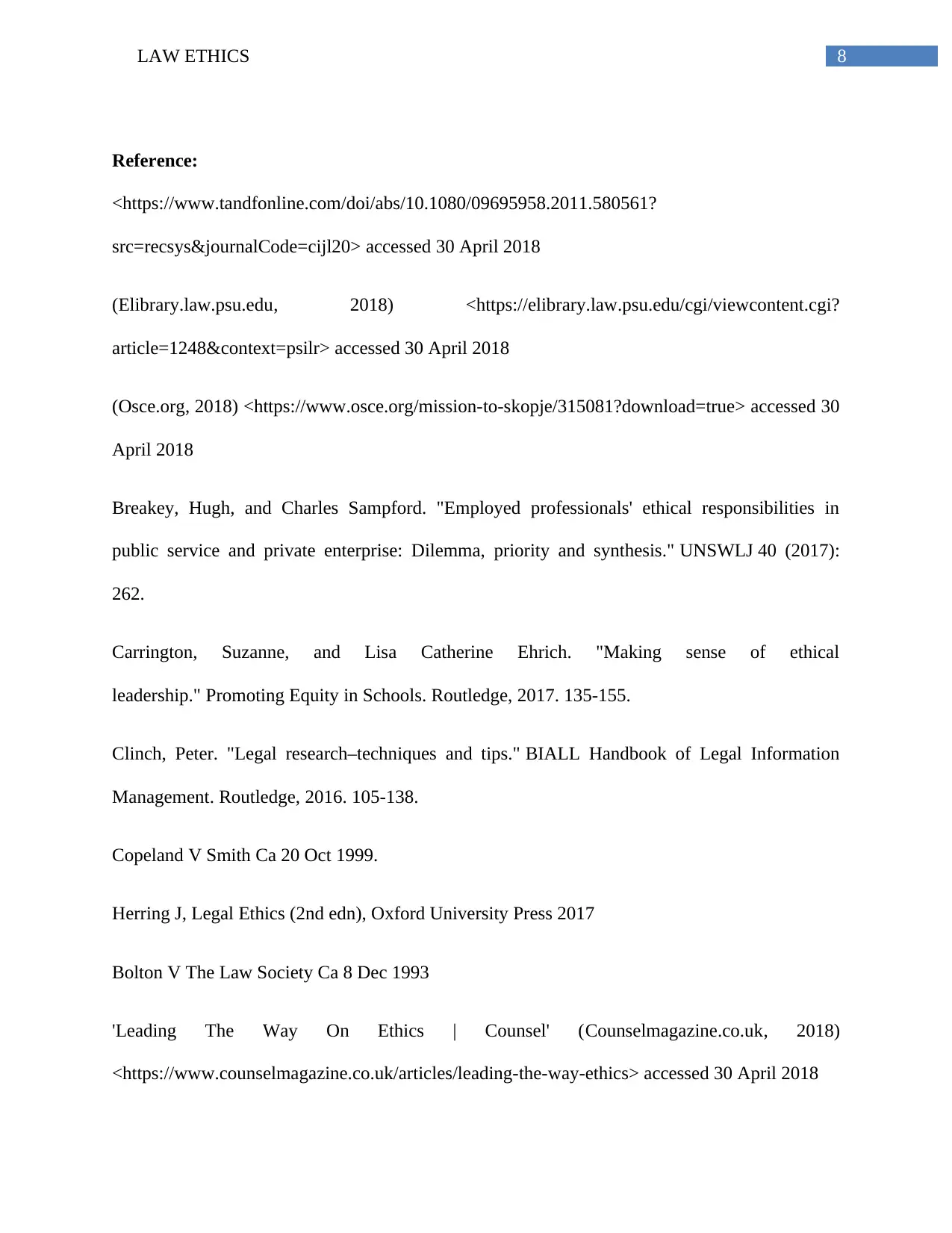
8LAW ETHICS
Reference:
<https://www.tandfonline.com/doi/abs/10.1080/09695958.2011.580561?
src=recsys&journalCode=cijl20> accessed 30 April 2018
(Elibrary.law.psu.edu, 2018) <https://elibrary.law.psu.edu/cgi/viewcontent.cgi?
article=1248&context=psilr> accessed 30 April 2018
(Osce.org, 2018) <https://www.osce.org/mission-to-skopje/315081?download=true> accessed 30
April 2018
Breakey, Hugh, and Charles Sampford. "Employed professionals' ethical responsibilities in
public service and private enterprise: Dilemma, priority and synthesis." UNSWLJ 40 (2017):
262.
Carrington, Suzanne, and Lisa Catherine Ehrich. "Making sense of ethical
leadership." Promoting Equity in Schools. Routledge, 2017. 135-155.
Clinch, Peter. "Legal research–techniques and tips." BIALL Handbook of Legal Information
Management. Routledge, 2016. 105-138.
Copeland V Smith Ca 20 Oct 1999.
Herring J, Legal Ethics (2nd edn), Oxford University Press 2017
Bolton V The Law Society Ca 8 Dec 1993
'Leading The Way On Ethics | Counsel' (Counselmagazine.co.uk, 2018)
<https://www.counselmagazine.co.uk/articles/leading-the-way-ethics> accessed 30 April 2018
Reference:
<https://www.tandfonline.com/doi/abs/10.1080/09695958.2011.580561?
src=recsys&journalCode=cijl20> accessed 30 April 2018
(Elibrary.law.psu.edu, 2018) <https://elibrary.law.psu.edu/cgi/viewcontent.cgi?
article=1248&context=psilr> accessed 30 April 2018
(Osce.org, 2018) <https://www.osce.org/mission-to-skopje/315081?download=true> accessed 30
April 2018
Breakey, Hugh, and Charles Sampford. "Employed professionals' ethical responsibilities in
public service and private enterprise: Dilemma, priority and synthesis." UNSWLJ 40 (2017):
262.
Carrington, Suzanne, and Lisa Catherine Ehrich. "Making sense of ethical
leadership." Promoting Equity in Schools. Routledge, 2017. 135-155.
Clinch, Peter. "Legal research–techniques and tips." BIALL Handbook of Legal Information
Management. Routledge, 2016. 105-138.
Copeland V Smith Ca 20 Oct 1999.
Herring J, Legal Ethics (2nd edn), Oxford University Press 2017
Bolton V The Law Society Ca 8 Dec 1993
'Leading The Way On Ethics | Counsel' (Counselmagazine.co.uk, 2018)
<https://www.counselmagazine.co.uk/articles/leading-the-way-ethics> accessed 30 April 2018
⊘ This is a preview!⊘
Do you want full access?
Subscribe today to unlock all pages.

Trusted by 1+ million students worldwide
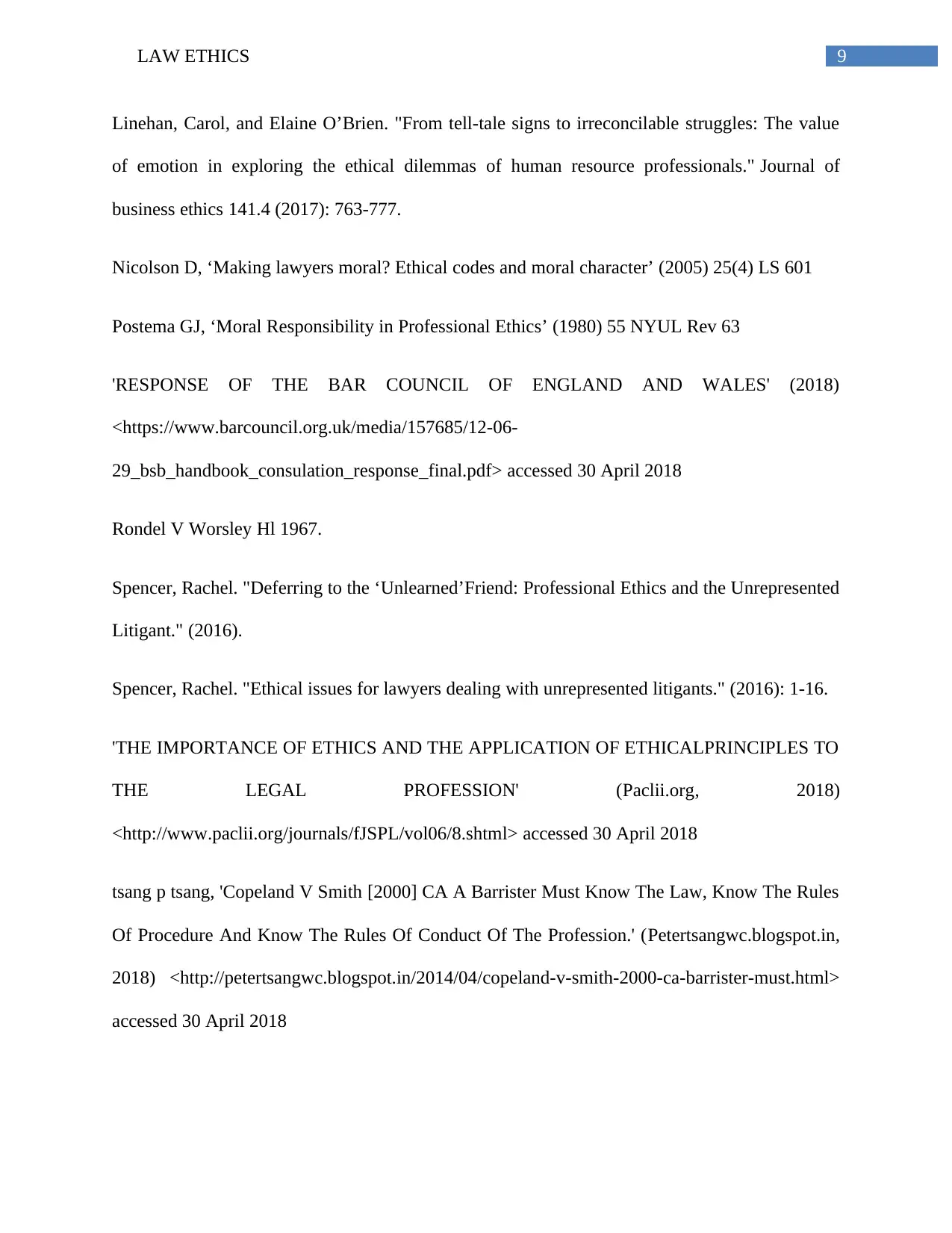
9LAW ETHICS
Linehan, Carol, and Elaine O’Brien. "From tell-tale signs to irreconcilable struggles: The value
of emotion in exploring the ethical dilemmas of human resource professionals." Journal of
business ethics 141.4 (2017): 763-777.
Nicolson D, ‘Making lawyers moral? Ethical codes and moral character’ (2005) 25(4) LS 601
Postema GJ, ‘Moral Responsibility in Professional Ethics’ (1980) 55 NYUL Rev 63
'RESPONSE OF THE BAR COUNCIL OF ENGLAND AND WALES' (2018)
<https://www.barcouncil.org.uk/media/157685/12-06-
29_bsb_handbook_consulation_response_final.pdf> accessed 30 April 2018
Rondel V Worsley Hl 1967.
Spencer, Rachel. "Deferring to the ‘Unlearned’Friend: Professional Ethics and the Unrepresented
Litigant." (2016).
Spencer, Rachel. "Ethical issues for lawyers dealing with unrepresented litigants." (2016): 1-16.
'THE IMPORTANCE OF ETHICS AND THE APPLICATION OF ETHICALPRINCIPLES TO
THE LEGAL PROFESSION' (Paclii.org, 2018)
<http://www.paclii.org/journals/fJSPL/vol06/8.shtml> accessed 30 April 2018
tsang p tsang, 'Copeland V Smith [2000] CA A Barrister Must Know The Law, Know The Rules
Of Procedure And Know The Rules Of Conduct Of The Profession.' (Petertsangwc.blogspot.in,
2018) <http://petertsangwc.blogspot.in/2014/04/copeland-v-smith-2000-ca-barrister-must.html>
accessed 30 April 2018
Linehan, Carol, and Elaine O’Brien. "From tell-tale signs to irreconcilable struggles: The value
of emotion in exploring the ethical dilemmas of human resource professionals." Journal of
business ethics 141.4 (2017): 763-777.
Nicolson D, ‘Making lawyers moral? Ethical codes and moral character’ (2005) 25(4) LS 601
Postema GJ, ‘Moral Responsibility in Professional Ethics’ (1980) 55 NYUL Rev 63
'RESPONSE OF THE BAR COUNCIL OF ENGLAND AND WALES' (2018)
<https://www.barcouncil.org.uk/media/157685/12-06-
29_bsb_handbook_consulation_response_final.pdf> accessed 30 April 2018
Rondel V Worsley Hl 1967.
Spencer, Rachel. "Deferring to the ‘Unlearned’Friend: Professional Ethics and the Unrepresented
Litigant." (2016).
Spencer, Rachel. "Ethical issues for lawyers dealing with unrepresented litigants." (2016): 1-16.
'THE IMPORTANCE OF ETHICS AND THE APPLICATION OF ETHICALPRINCIPLES TO
THE LEGAL PROFESSION' (Paclii.org, 2018)
<http://www.paclii.org/journals/fJSPL/vol06/8.shtml> accessed 30 April 2018
tsang p tsang, 'Copeland V Smith [2000] CA A Barrister Must Know The Law, Know The Rules
Of Procedure And Know The Rules Of Conduct Of The Profession.' (Petertsangwc.blogspot.in,
2018) <http://petertsangwc.blogspot.in/2014/04/copeland-v-smith-2000-ca-barrister-must.html>
accessed 30 April 2018
1 out of 10
Related Documents
Your All-in-One AI-Powered Toolkit for Academic Success.
+13062052269
info@desklib.com
Available 24*7 on WhatsApp / Email
![[object Object]](/_next/static/media/star-bottom.7253800d.svg)
Unlock your academic potential
Copyright © 2020–2026 A2Z Services. All Rights Reserved. Developed and managed by ZUCOL.





